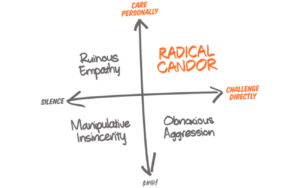In the first part of our Feedback Series, we discussed the important shift in mindset from feeling like a failure to being an ever-improving failer. This is how your team members should think about constructive criticism so they are most receptive to it – and even appreciative of it.
Now it’s time to cover the other side of the feedback equation: delivering candid and sometimes hard-to-hear critiques. Buckle up, this journey may be uncomfortable at first.
We understand giving tough feedback is not a piece of cake for most people. As Erin Meyers has found in her research on feedback across cultures, Americans in particular tend to dance around giving criticism, laying it down only after offering many kudos, and then finishing with more pats on the back. This pattern of building up and ending with compliments, only to drop a hint of a suggestion of improvement, leaves room for major misinterpretation.
Some leaders are so non-confrontational they choose to skip giving constructive criticism altogether – even if said feedback would ultimately help their company succeed and the team member improve professionally.
Let’s say that again for the people in the back. When feedback is not communicated in a way that is clear and sincere (or worse, not communicated at all), the growth of your team members and your company is at stake.
We are certainly not here to place judgement! In fact, the Montani team loves guiding our clients to improved feedback loops because we understand it’s not easy, but extremely important.
One of the delivery methods Montani champions is Radical Candor. In the words of Author Kim Scott, who coined the term, Radical Candor is “guidance and feedback that’s both kind and clear, specific and sincere.” And we particularly love using the feedback framework her team created to serve as a compass for candid conversations.

As the framework shows, people who manage people need to aim for the sweet spot of challenging their team while also showing they truly care about them. If they drop the ball in either (or both) directions, what you get is a #FeedbackFail.
At its core, Radical Candor is all about being approachable in your feedback conversations. Connecting personally with the team member so they feel comfortable. Employees must trust the person giving them feedback, and must believe the one delivering criticism truly has their best interests at heart. Without this, you risk the team member feeling torn down rather than coached up.
How do you ensure a team member will be receptive to feedback? Leaders first have to establish what we call relationship equity. Managers must make “deposits,” big or small, of authentic, positive interactions and communication that build up the relationship with their employees. Fill their relationship bucket, if you will. In short, leaders have to truly care about their team members. When those hard conversations do need to be had, the team member will enter that conversation with a sense of trust and willingness to receive feedback – and the relationship won’t dip “in the red” thanks to the efforts made before this discussion.
There’s a reason the word “radical” was used to describe this method of delivery. It’s a very different (and, yes, uncomfortable at first) way of communicating criticism. But if you set expectations early for new hires – for instance, as part of onboarding, share the “tough questions” that will be discussed in performance reviews down the line – they will view the critical conversations as simply part of the culture and process every team member goes through. Shock factor, removed.
The Montani team has seen firsthand, through our individual past experiences in leadership and internal HR, that the Radical Candor framework really does work.
Our team also believes in the three elements of a powerful feedback conversation outlined in the HBR article, How to Give Tough Feedback That Helps People Grow. These elements are to to the point, but really outline what needs to happen during tough discussions in order to achieve the best outcome:
- An intention to help the employee grow, rather than to show him he was wrong.
- Openness on the part of the feedback giver, which is essential to creating a high-quality connection that facilitates change.
- Inviting the employee into the problem-solving process.
If Radical Candor and/or the elements above sound foreign to you, it’s likely time to work on the feedback loops within your organization. Few people enjoy tough conversations (whether you’re the one giving or receiving feedback), but they are essential to the growth of your business, as well as to the development of your people.
If your team could use guidance or a feedback plan specifically created with your business objectives in mind, let’s start a conversation. The Montani team specializes in effective intercommunication – and this just might be the map your organization needs to reach its peak.


